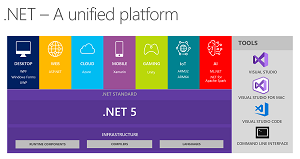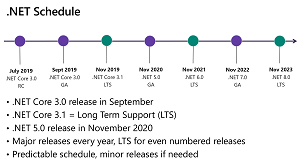News
.NET 5 Performance Improvements Cited with 250-Plus Pull Requests
In what might well be the longest post ever on Microsoft's Developer Blogs site, Stephen Toub has documented performance improvements coming in .NET 5, the milestone all-things-.NET unification effort debuting in November that completes Microsoft's transition from the ageing Windows-only .NET Framework to the open source, cross-platform .NET Core direction.
Toub, a partner software engineer on the .NET team, highlights more than 250 pull requests made via GitHub in the transparent effort to create .NET 5, announced at the 2019 Build developer conference with great fanfare and the citing of improvements such as:
- Producing a single .NET runtime and framework that can be used everywhere and that has uniform runtime behaviors and developer experiences.
- Expanding the capabilities of .NET by taking the best of .NET Core, .NET Framework, Xamarin and Mono.
- Building that product out of a single code-base that developers (Microsoft and the community) can work on and expand together and that improves all scenarios.
 [Click on image for larger view.] .NET 5 (source: Microsoft).
[Click on image for larger view.] .NET 5 (source: Microsoft).
The massive July 13 post detailing all of the performance improvements is a tl;dr candidate if there ever was one, but Toub indicates there is yet more to come.
".NET 5 has already seen a wealth of performance improvements, and even though it's not scheduled for final release until this fall and there's very likely to be a lot more improvements that find their way in by then, I wanted to highlight a bunch of the improvements that are already available now. In this post, I'll highlight ~250 pull requests that have contributed to myriad of performance improvements across .NET 5." he said.
To provide an overview of specific areas that might be of interest in the tome, improvements are grouped thusly:
As impressive as the list is, there's still a lot of functionality that isn't going to be baked into .NET 5 in its initial release because of development delays caused by the COVID-19 pandemic.
 [Click on image for larger view.] The .NET Schedule (source: Microsoft).
[Click on image for larger view.] The .NET Schedule (source: Microsoft).
"In the wake of the global health pandemic, we've had to adapt to the changing needs of our customers and provide the support needed to assist with their smooth operations," said Scott Hunter, director of program management, .NET, in a post published during this year's Build developer conference. ". Our efforts continue to be anchored in helping our customers address their most urgent needs. As a result, we expect these features to be available in preview by November 2020, but the unification will be truly completed with .NET 6, our Long-Term Support (LTS) release. Our vision hasn't changed, but our timeline has."
Toward the end of his treatise, Toub points out upcoming performance improvements that didn't make it into his list and one class of performance regressions pertaining to International Components for Unicode (ICU).
"With .NET 5 previews and nightly builds available, I'd encourage you to download the latest bits and give them a whirl with your applications. And if you find things you think can and should be improved, we'd welcome your PRs to dotnet/runtime!" Toub finally concluded.
"Thank you for this very long and detailed article. Those numbers are impressive!" said one reader comment.
About the Author
David Ramel is an editor and writer at Converge 360.